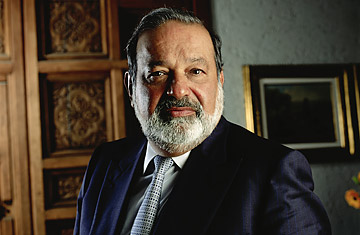
Mexican financier Carlos Slim Helu.
But while U.S. authorities have thwarted Gates' subjugation of the PC software business in recent years, Mexico has done precious little to rein in ubiquitous business empires like Slim's — which today accounts for almost half the Mexican stock exchange's $370 billion value and controls a horde of industries ranging from telecom to tobacco. Forbes magazine, in fact, noted that Slim's holdings alone represent about 7% of Mexico's GDP — and that if Gates held a similar share of the U.S. economy, he would be worth $874 billion.
All of which explains why few Mexicans were doing hat dances this week when Forbes announced that Slim, 67, had suddenly passed U.S. investment wizard Warren Buffett ($52 billion) as the world's second-richest person — and may well topple Gates as Numero Uno by the time next year's list is unveiled. Whereas Gates' wealth reflects America's tech leadership, Slim's riches —despite the sweat and savvy that built them — tend to symbolize Mexico's archaic system of monopolies and oligopolies, which helps keep almost half the nation's population in poverty by choking oxygen away from the rest of the economy. Gates' fortune is part of an engine that creates jobs; Slim's, say critics, is part of an order that sends Mexican migrants across the U.S. border looking for them. And Slim didn't aid his image much last month when he seemed to scoff at the celebrated philanthropy of Gates and Buffett. His priority, he told reporters, was to "accomplish and solve things, rather than giving. That is, not going around like Santa Claus."
As a result, Slim, still relatively unknown outside Mexico, seems destined in the coming year to be more than a rising name on the pages of Forbes. He's likely to become a poster boy of sorts in the ongoing cacophony over hemispheric issues like illegal immigration. One of the stiffest challenges facing Mexico's conservative new President, Felipe Calderon, is the creation of almost a million new, decent-paying jobs a year. But first, say most economists, Calderon has to accept a task that Mexican governments historically have dismissed — that is, regulate the monopolies, which lord over every industry from cement to broadcasting, and chip away at their epic privileges. The big reason for that urgency: the majority of Mexican workers are employed not by Big Business but by the nation's beleaguered small- and medium-sized enterprises.
Slim, fairly or not, is often fingered for some of the obstacles facing Mexico's underdogs. According to the Paris-based Organisation of Economic Cooperation & Development, for example, Telmex, which is the flagship of Slim's Grupo Carso and which controls 90% of Mexico's telephone market, charges small businesses some of the highest fees in the world. Telmex insists those charges have dropped considerably in recent years; but the situation points up the distortions that many feel help keep Mexico underdeveloped.
To his credit, Slim, a widely respected figure and the son of a Lebanese immigrant, seems to be acknowledging the problem. He has accepted, for example, a rare move by Mexico's Federal Competition Commission to block Telmex from expanding into cable television until it allows all competitors to be smoothly hooked up to its telecom services. And he is lifting his charitable profile, announcing he'll pour $10 billion over the next four years into his health- and education-related Fundacion Carso. Business and philanthropy experts alike hope these developments will help prime the pump not only in Mexico but throughout Latin America, where economic competition and charitable giving have abysmal histories. Slim may not have much competition at home, but when it comes to playing Santa Claus, he may finally be poised to take on the likes of Gates and Buffett.
